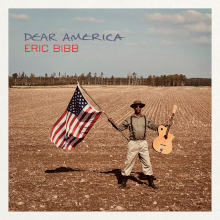The Graham Album Review #2086

Click on CD Cover for Audio Review in streaming mp3 format | |
Eric Bibb: Dear America
by George Graham
(Provogue Records, as broadcast on WVIA-FM 9/22/2021)

Click on CD Cover for Audio Review in streaming mp3 format | |
Eric Bibb: Dear America
by George Graham
(Provogue Records, as broadcast on WVIA-FM 9/22/2021)
Since the 1960s, the folk music scene has tended to be overwhelmingly white. There were a few notable African American performers such as Odetta, Richie Havens, and Taj Mahal, and in the 1980s, Tracy Chapman represented a new generation of folk-influenced singer-songwriters. And among the folksingers who went for socially conscience song, the civil rights struggle often provided the inspiration for protest songs. But African American folkies are still rare. The week we have a new recording by a long-time veteran of the scene, who has just released a new album that provides a degree of authenticity to some songs that address racial justice, along with a bunch of other tunes, in a blues-influenced setting. It’s by Eric Bibb, and it bears the title Dear America.
Eric Bibb was born into the music. His father Leon Bibb was a singer in musical theater and became apart of the New York folk scene. His uncle was the jazz pianist John Lewis, founder of the Modern Jazz Quartet. His godfather was singer, actor and vocalist Paul Robeson, and as Bibb was growing up, family friends included Pete Seeger and Bob Dylan. When he was 16 years old Eric Bibb was invited to play guitar on a TV show that Leon Bibb hosted, and then played regularly around New York.
Now 70 years old, Eric Bibb spent quite a few years in Europe, so he is not as well-known in the US as some of his cohort. He still lives in Sweden, and recorded his new album for a European based label. But the new album takes up his home country, both celebrating it, and lamenting how things have become. The album was recorded in late 2019 mainly in New York before the pandemic, with contributions from musicians recording in numerous cities. Prominent names include jazz bassist Ron Carter, Chicago blues harmonica man Billy Branch, guitarist Eric Gales, and guest vocalists including Shaneeka Simon and Lisa Mills. The arrangements range from almost solo acoustic to very electric.
Opening is one of the more lighthearted tracks, Whole Lotta Lovin’. It’s one of the tunes that features bassist Ron Carter. It’s a kind of celebration of the good things of life. <<>>
The album heads into issues on the following piece Born of a Woman which powerfully laments sexual abuse. <<>> The guest vocal is by Shaneeka Simon. <<>>
A song that seems quite appropriate in this day and age is Whole World’s Got the Blues. Eric Gales is the guest on guitar. <<>>
The title song Dear America is another articulate commentary on the state of affairs, in a kind of low-down blues context. <<>>
Along the same lines lyrically is Tell Yourself though the laid back song advises one to look on the bright side. <<>>
One of the most powerful songs on the album is Emmett’s Ghost an intimate-sounding track that recounts the personal effects of the murder of Emmett Till, a young African boy in 1955 which helped to set the civil rights movement in motion. <<>>
The song called White and Black is about just that, considering racism in its various forms. <<>>
The album’s orientation toward social issues is tempered by another by another song about gratitude Along the Way. It’s in a nice intimate acoustic setting. <<>>
The album ends with The One-Ness of Love which is not-surprisingly is a love song. Lisa Mills is the guest vocalist. <<>>
Eric Bibb has had a long and active career as a folk musician, going back to the 1960s. But despite growing up in the heart of the New York folk scene, he has spent most of his time in Europe, and as a result, Bibb is not as well-known in the US. But several of his numerous albums have been released in his home country. We featured his 2003 release Natural Light on this review series. Lyrically, this is probably the most powerful album I have heard from Bibb, as he takes up some of the problems of the world, and racial justice, in an understated but articulate way. The mix of styles from acoustic to electric makes for interesting listening.
However, our grade for sound quality is no better than a “C.” The recording was badly over-compressed with an in-your-face sound that often reaches the point of distortion. The sound is cold and uninviting. I find it fatiguing to listen to.
Eric Bibb has created another worthwhile album that combines a bluesy musical complexion with a kind of classic folksinger’s vision from an African American perspective.
(c) Copyright 2021 George D. Graham. All rights reserved.
This review may not be copied to another Web site without written permission.
 To Index of Album Reviews | To George Graham's Home Page. | What's New on This Site.
To Index of Album Reviews | To George Graham's Home Page. | What's New on This Site.